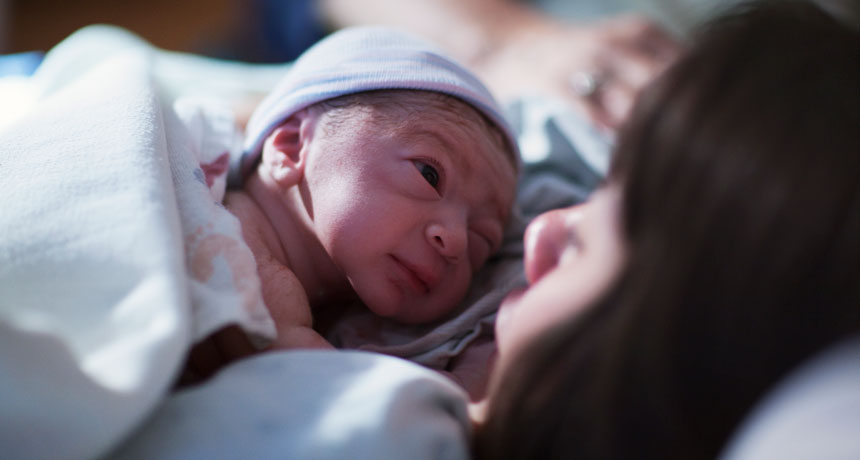Most Americans think it’s OK to tweak a baby’s genes to prevent disease

Only a day after the first test-tube baby turned 40, a poll about American’s attitudes toward tweaking unborn babies’ genes reveals the hopes and hesitations of being on the brink of the latest reproductive era.
Americans generally favor gene editing, but only for heading off diseases. Boosting intelligence would be “taking medical technology too far,” survey respondents said. (Not that scientists know how to genetically boost intelligence now anyway.) And few people were on board with doing the research necessary to cure disease or up IQ scores — research most likely to involve editing embryos, sperm or eggs because you have to make the changes as early in development as possible for maximum effect.
Even so, the poll — released July 26 by the Pew Research Center — suggests that acceptance for the idea of gene editing is growing as fast as advances in the technology itself. In 2014, people were only just beginning to hear about such molecular scissors as CRISPR/Cas9 or other enzymes being used to cut or alter genes to fix disease-causing variants. A Pew poll that December, while not entirely comparable, found that only 46 percent of Americans contacted said it was appropriate to alter a baby’s genetic makeup to head off disease.
Now we’re living in an age of “three-parent babies” (created by swapping the DNA from a fertilized egg with unhealthy mitochondria into an empty egg with healthy mitochondria) and millions of babies born by in vitro fertilization each year. And last year, scientists successfully edited viable human embryos to repair a version of a gene that leads to heart failure.
Americans may be getting more comfortable with the technology as they hear more about it. This time around, 72 percent of Americans surveyed favored changing an unborn baby’s genetic makeup to treat a disease or condition that would be present at birth. Pew researchers base the results on answers from 2,537 U.S. adults contacted from April 23 to May 6.
Americans are still not on board with making so-called “designer babies.” In 2014, only 15 percent of Americans thought tweaking genes to make a baby more intelligent was OK. Enhancing intelligence — one of most often cited designer baby options — isn’t much more popular now. Only 19 percent of Americans in the new poll agreed that boosting intelligence was a fitting use of gene-editing, while 80 percent said making smarter babies would be taking medical technology too far.
Take a closer look at the numbers, and you’ll find, not surprisingly, that American’s opinions can vary widely between subgroups.
The more you know
Compared with those who know nothing about gene editing, those familiar with the gene editing were more likely to:
Say it is appropriate to cure diseases that would be present at birth (71 percent versus 64 percent unfamiliar with the technology);
Believe it will help people live longer, healthier lives (34 percent versus 14 percent);
Worry that the technology will lead to inequality if it is only available to the rich (64 percent versus 53 percent);
Fear that scientists will deploy the technology before its health consequences are fully understood (54 percent versus 43 percent).
Religion matters
Compared with people who identified themselves as not very religious, highly religious people were:
Less likely to support gene editing to correct diseases a baby would have at birth (57 percent versus 82 percent of the less religious respondents);
More likely to say using gene editing to boost intelligence crosses a line (93 percent versus 72 percent);
Much less likely to support human embryo research (11 percent versus 55 percent).
Scientific knowledge matters, too
People who know a lot about science (as measured by answers to nine general science knowledge questions) were more gung ho about using gene editing than even the general public was. Compared with those with low science knowledge, those in the know were:
More likely to say correcting a congenital disease or condition is an appropriate use of medical technology (86 percent versus 58 percent);
More likely to say altering a baby’s genes to reduce the risk of disease later in life was appropriate (71 percent versus 49 percent);
Only slightly more accepting of boosting intelligence (24 percent versus 21 percent).
Yet the poll also reveals deep qualms about the type of research needed to make gene editing hopes a reality. The survey doesn’t specify that editing would be done in embryos. But it’s not exactly easy to do gene editing or any other type of therapy on a fetus, so editing embryos, eggs or sperm outside the body may be the most convenient place to start.
Americans are uncomfortable with experimenting on human embryos to make gene editing possible: 65 percent of respondents said if development of gene editing requires experimenting on human embryos, that’s taking medical technology too far.
Some people think the line has already been crossed with researchers in China and Europe editing embryos for research purposes. Others fear it may be impossible to cure some genetic diseases without embryo work. Time will certainly tell, and one day people may celebrate the 40th birthday of the world’s first gene-edited baby.



